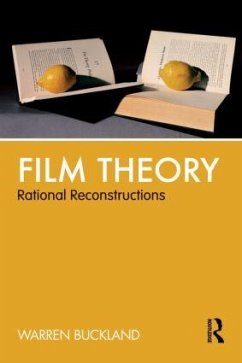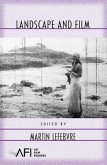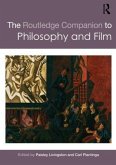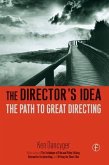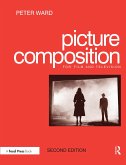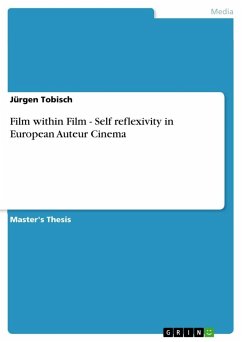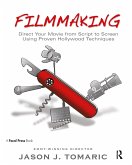In Film Theory: Rational Reconstructions, Warren Buckland asks a series of questions about how film theory gets written in the first place:
How does it select its objects of study and its methods of inquiry?How does it make discoveries and explain filmic phenomena? And, How does it formulate and solve theoretical problems?
He asks these questions of film theory through a rational reconstruction and a classical commentary. Both frameworks clarify and reformulate vague and inexact expressions, redefine obscure concepts, and examine the underlying logic of film theory arguments. This not only subjects film theory to rigorous examination; it also teaches students how to write theory, by enabling them to question and critically interrogate the logic of previous film theory arguments.
The book consists of nine chapters that closely examine a series of canonical film books and essays in great detail, by Peter Wollen, Laura Mulvey, Thomas Elsaesser, Stephen Heath, and Slavoj Zizek, among others.
Hinweis: Dieser Artikel kann nur an eine deutsche Lieferadresse ausgeliefert werden.
How does it select its objects of study and its methods of inquiry?How does it make discoveries and explain filmic phenomena? And, How does it formulate and solve theoretical problems?
He asks these questions of film theory through a rational reconstruction and a classical commentary. Both frameworks clarify and reformulate vague and inexact expressions, redefine obscure concepts, and examine the underlying logic of film theory arguments. This not only subjects film theory to rigorous examination; it also teaches students how to write theory, by enabling them to question and critically interrogate the logic of previous film theory arguments.
The book consists of nine chapters that closely examine a series of canonical film books and essays in great detail, by Peter Wollen, Laura Mulvey, Thomas Elsaesser, Stephen Heath, and Slavoj Zizek, among others.
Hinweis: Dieser Artikel kann nur an eine deutsche Lieferadresse ausgeliefert werden.
"Is film theory a "rational" discourse? Warren Buckland provides both a reconstruction and a commentary of some of the most relevant contributions on film, in an attempt to bring to the foreground the "whys" and the "hows" that move these discourses. In the eyes of an inflexible - even if passionate - reviewer, we discover a controversial landscape, and we challenge the "ideas of cinema" that are still predominant in our discipline." Francesco Casetti, Yale University, USA
"A patient and meticulous look at some of the most important contributions in contemporary film theory, "Rational Reconstructions" is an essential read for everyone with a stake in film studies and theory today. With an impressive breadth of scholarship, and minute attention to implicit and explicit arguments, Buckland traces the basic problems that various theories have sought to resolve while expertly scouting the emergence and use of concepts. In the process, he offers us tools with which to evaluate film theoretical concepts on their own ground giving his project a unique meta-critical value. No other book has so effectively sythesized nor offered such close readings of the theoretical material discussed here. Moreover, Buckland's talent for clear and systematic exposition makes his study accessible and pleasurable without in any way depriving it of its acumen. All students of film theory will be reading this for years." Martin Lefebvre, Concordia University, Canada
"Warren Buckland offers a bracing review of what are by now some of the classic texts of film theory. Essentially a reconstruction of the intellectual contexts within which key concepts of film theory were developed, Buckland subjects these concepts to rigorous logical and historical analysis, revealing their origins in theoretical debates of the time, and evaluating their significance for the present. This is an invaluable contribution to the ongoing renewal of the field of film theory." Marc Furstenau, Carleton University, Canada
"A patient and meticulous look at some of the most important contributions in contemporary film theory, "Rational Reconstructions" is an essential read for everyone with a stake in film studies and theory today. With an impressive breadth of scholarship, and minute attention to implicit and explicit arguments, Buckland traces the basic problems that various theories have sought to resolve while expertly scouting the emergence and use of concepts. In the process, he offers us tools with which to evaluate film theoretical concepts on their own ground giving his project a unique meta-critical value. No other book has so effectively sythesized nor offered such close readings of the theoretical material discussed here. Moreover, Buckland's talent for clear and systematic exposition makes his study accessible and pleasurable without in any way depriving it of its acumen. All students of film theory will be reading this for years." Martin Lefebvre, Concordia University, Canada
"Warren Buckland offers a bracing review of what are by now some of the classic texts of film theory. Essentially a reconstruction of the intellectual contexts within which key concepts of film theory were developed, Buckland subjects these concepts to rigorous logical and historical analysis, revealing their origins in theoretical debates of the time, and evaluating their significance for the present. This is an invaluable contribution to the ongoing renewal of the field of film theory." Marc Furstenau, Carleton University, Canada

